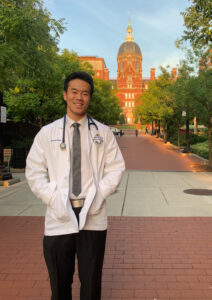Takeaway
Through empathic listening, all members of the healthcare team can build rapport with patients in their most vulnerable moments.

Connecting with Patients | December 1, 2020 | 4 min read
By Howard Chang, Medical Student, Johns Hopkins Medicine
“Why do you feel that way?”
My one simple question opened the Pandora’s box of my patient’s life. Rarely had I heard stories as devastating as his, from his recurrent violent childhood abuse to persistently debilitating medical conditions. His life had been one trial after another. I quickly understood why he was so afraid that his current medical problem would never improve.
With many nods of sympathy and shakes of my head in empathetic disbelief, I listened—with great heartache and responsibility—to the most intimate and harrowing details of his life. But the most surprising detail was yet to come.
“Have you ever talked about this with a therapist or doctor?”
“No,” he said. “I rarely talk about these things with anybody. I don’t like to talk about it.”
I was floored. He’d been regularly receiving medical care for most of his adult life due to his litany of health issues. But beyond brief mentions of his childhood abuse, he’d never disclosed the extent of his trauma with anyone who could treat him—until now. With me. And as a medical student, I couldn’t even treat him.
The sanctity of patients’ trust
With my patient’s permission, I shared all of this with his physician, who was my preceptor that day. The physician immediately understood the seriousness of the matter, and spoke with our patient about it. This reassured me. Since my patient’s traumatic life experiences were immediately relevant to his present health issues, his physicians would likely need to treat his unresolved psychological distress in order to fully treat his pain. But for years, he didn’t even feel like he had an entryway into exploring these issues within the medical system. What potentially underlay all his pain—and his stunted recovery—was something he hadn’t shared with his doctors. How could this have happened? Among everything my patient told me, one provided an important clue:
“I guess I feel safe right now. You seem like a very kind person. So I think I can trust you.”
His implication was that he didn’t feel he could trust anyone in medicine before I came along. I took this not as a compliment, but as an indictment of the medical system. 15-minute reimbursement-focused office visits weren’t going to uncover the depths of his suffering. That was barely enough time to take a cursory history, perform a physical examination, review his labs, and discuss additional testing and treatment.
I’ve gleaned that many doctors are in fact willing and wanting to hear their patients’ life stories and address their emotional needs—especially as they pertain to present health issues. But they’re constrained by external factors that pressure them, at best, to refer patients with “complex” psychosocial problems to psychiatrists or social workers. When patients already don’t feel safe with their current clinicians, they may not trust a referral either.
As a medical student, sometimes I’m disappointed and enervated by the increasingly transactional nature of the patient-physician relationship. I wonder how I’ll commit, without wavering, to the heart of patient care, especially when hounded by the threat of technocratic medicine.
Being trustworthy clinicians
There is, however, one indispensable lesson that my patient taught me: while we can’t immediately mitigate the external impedances to patient care, we can always recognize and resolve the internal impedances within ourselves. Had I decided to ignore his subtle hints that something might be really wrong, I wouldn’t have asked him to tell me why he thought and felt that way. I could have quickly apologized and steered the conversation “back on track” to his medical diagnosis. And after he began to open up about his trauma, I could have decided not to ask whether he had previously shared this with any of his doctors. But I kept prodding, and he kept sharing, and trust began to emerge between patient and medical student—someone who could not provide him any real medical care, but who could advocate for him. Could that perhaps be the care he really needed?
We hear in medical training how empathetic listening is so important to patient care. I’ve wondered what difference it makes to patients beyond their level of satisfaction. Can empathetic listening influence “hard” outcomes, like healthcare utilization, morbidity, and mortality, or does it serve primarily to make patients feel warm and fuzzy inside? And does this even matter?
My patient answered both questions for me. Even if empathetic listening yielded no detectable differences in “hard” outcomes, the tears he shed and the relief I saw in his eyes from feeling like someone truly cared was enough evidence of its value for me. And when I asked him if he’d be open to exploring these issues further with a therapist—something he hadn’t wanted to do before—he hesitated, but said he was open. At that moment, that meant a lot. Perhaps the “hard” outcome would indeed be a first-time referral that begins the process of deep healing for this man. Or, perhaps, that our clinic would finally become a safe place for him—where he had people could trust with the most painful areas of his life, without judgment or shame. Among the outcomes we might achieve together, this may very well be the “hardest” of all.

